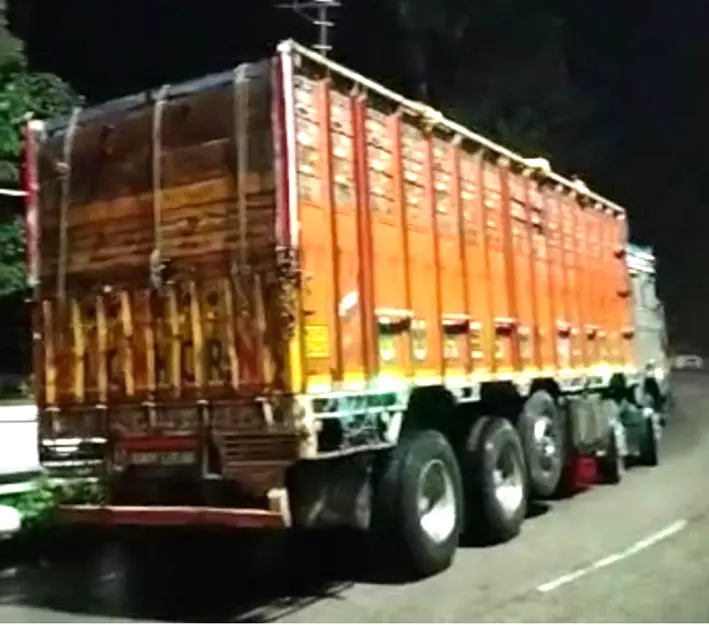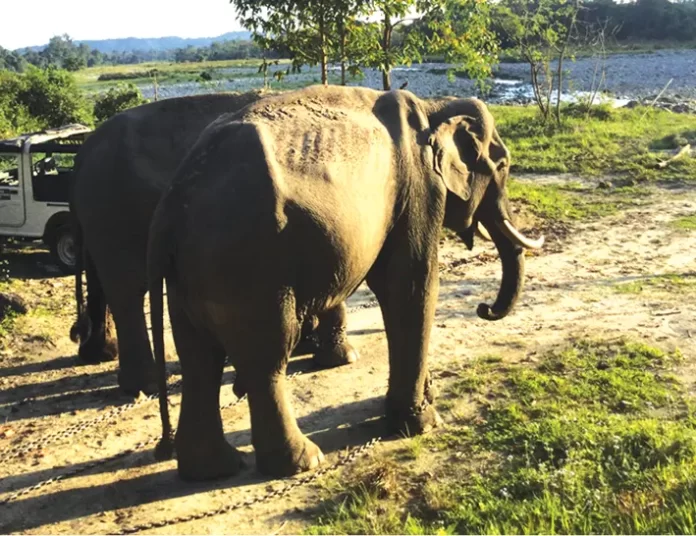
Monday Musing
[ Tongam Rina ]
Elephants are travellers. They walk far and wide. But not all elephants are as lucky. Enslaved by humans, they are forced to travel in trucks for thousands of kilometres, locked in for days together with a ‘fit to travel’ certificate to a land where there are no elephants.
In the last two years, dozens of captive elephants from Arunachal have been transported to Gujarat’s Radhe Krishna Temple Elephant Welfare Trust in Jamnagar, funded by Reliance Industry of the powerful Ambanis.
Even the court got involved, but that has only made it easier for elephants to be transported to an alien land.
With information less forthcoming, there are very scanty details, but papers available with this daily say that at least a total of 39 elephants.
In October 2021, two were sent to Gujarat. The forest department confirmed that seven elephants were sent to the temple trust in April, 2022, while 10 were sent in June 2022. There is another letter with names and details of microchipping issued by the Supreme Court appointed high-powered committee, taking the total to 39.
The committee was formed to check and fact-find details regarding import, transfer, procurement, rescue, and rehabilitation of wild animals, including those in captivity, across the country.
In a letter to the chief wildlife warden of Arunachal Pradesh, former SC judge Deepak Verma, who is the chairperson of the court-appointed high-powered committee, wrote that the committee had recommended 23 elephants to be transferred to the Radhe Krishna Temple Elephant Welfare Trust in Jamnagar, Gujarat. The letter, written on 4 April, 2023, says that 20 elephants were under the jurisdiction of Arunachal. The letter directed the warden that the transfers must be carried out as expeditiously as possible and in any case within two to three weeks from today.
Names and microchips details provided by the HPC and the forest department do not match, so it’s not difficult to conclude that 20 more were sent or the process is ongoing. If one scrutinises the 20 names provided by the HPC and the clearance for transportation already given by the forest department to the rest, there is just one name that matches. But it has a different microchip number.
The Gujarat government says: “Trust has adequate facilities to house more than 150 elephants with state-of-art elephants’ hospital and other facilities.” This claim has been repeated by the elephant owners in Arunachal in their letters to the trust, abdicating their rights over the elephants.
A letter written by an owner informs the managing trustee of the elephant welfare trust that there are 19 elephants under the ownership of the trust and “there are 152 elephants at your elephant care centre at Moti Khavdi, which is a recognised centre by the state wildlife department, government of Arunachal.”
There is a certain urgency in transportation of elephants that can’t be explain because papers are in place but there are several questions that await answer from the forest departments of Arunachal and Gujarat, the owners and the temple trust.
On 30 May, 2022, the chief wildlife warden of Gujarat wrote to Arunachal’s principal chief conservator of forest that his office had no objection to the proposal for transferring 10 elephants to the Radhe Krishna temple.
The proposal was sent on 27 May, 2022 by the Arunachal Pradesh forest department.
Within the last two weeks of May, 2022, a lot happened. The forest departments of Gujarat and Arunachal, private owners of the elephants, and the trust cleared transportation of elephants from Arunachal to Gujarat. That looks like a record of sorts in terms of clearing paper work.
Kamno from Chongkham
Elephant is a scheduled animal; therefore protected. You cannot just own an elephant. There is tedious paperwork, but then there is Kamno.
From Chongkham, Kamno is one of the elephants who was ‘donated’ to the trust and transported in June last year. Born on 03/01/2015, the then seven-year-old male elephant was donated/gifted to the temple trust because the owner, Chow Molaseng Namshum, wasn’t able to take care of the calf.
He writes to the trust that he has been taking care of the captive elephant since birth and that he got ownership certificate on 25th May, 2022! The elephant was microchipped on 21 May.
Close perusal of such authorisation/abdication letters seems to have been drafted by the trust and not the ‘donors’. The details provided in these letters have more information about the trust than the elephants.
The trust on 27 May writes to Namshum stating that, after execution of undertaking of donation, he cannot reclaim ownership of Kamno from us. Elephants are technically owned by the government, so it gives an ownership certificate for five years. Now, has the rules for ownership been relaxed for the temple trust?
The hurried manner in which Kamno was microchipped, ownership certificate issued and transferred to the trust needs explanation from the authority.
Unni and Laxmi
Unni and Laxmi were the first ones to be transported to the temple trust. In October 2021, they made the arduous journey to Gujarat from Banderdewa, Papum Pare.
The convoy carrying Laxmi and Unni were stopped in West Bengal and detained. However, they were handed back to the Assam forest deparment by the Bengal authorities with a stern note stating that that they were not microchipped, though there were papers to substantiate that both of them were microchipped already, and that there has been violation of the Wildlife Act. The documents were issued by the forest department of Arunachal. How did Assam’s forest department get involved?
The excuse was that Unni and Laxmi’s handlers had managed to run from them when stopped in Assam. Some details do not add up, though. They were released from Assam forest department’s custody with all the papers ready.
One of the persons travelling with Unni and Laxmi who was detained by the Bengal forest department is one Omanakuttan Pillai, who had the power of attorney for the two. How did he manage to get the power of attorney when he already has a case against him in Kerala for illegal transfer of animal dating back to 2012? The Arunachal forest department did not care or forgot to do a background check before issuance of papers.
While there are no details on ownership about Unni, Laxmi was purchased from Okep Tayeng of Borguli of East Siang by one Kuruvilla Cherian of A Sector, Naharlagun.
Laxmi was registered with the department in 2002 and ownership certificate was issued to Cherian in 12 February, 2018 for a period of five years.
Unni, a female, was a little over seven years old when transferred to the trust.
None of the papers that were scrutinised by this paper says anything about how elephants became captive.
Laxmi was purchased though sale of a scheduled animal is prohibited by Indian law. The forest department certifies that Laxmi was purchased. Purchased while in captivity, all illegal, Laxmi once again had a new owner.



